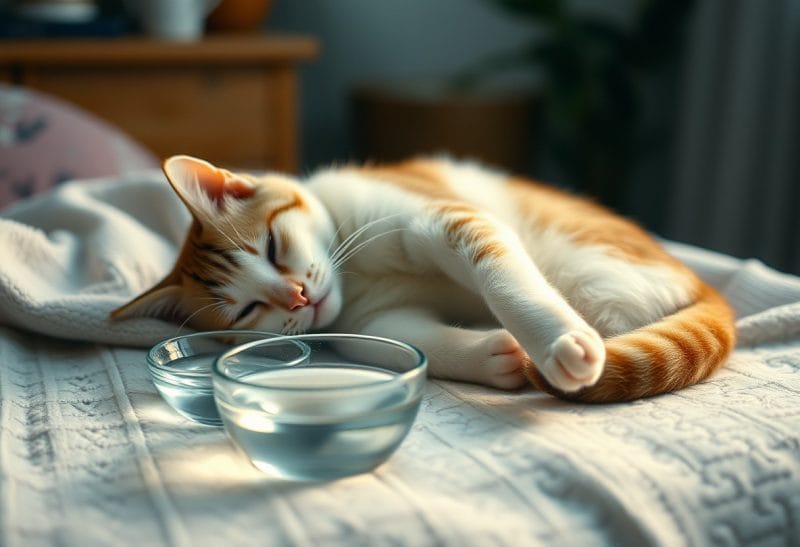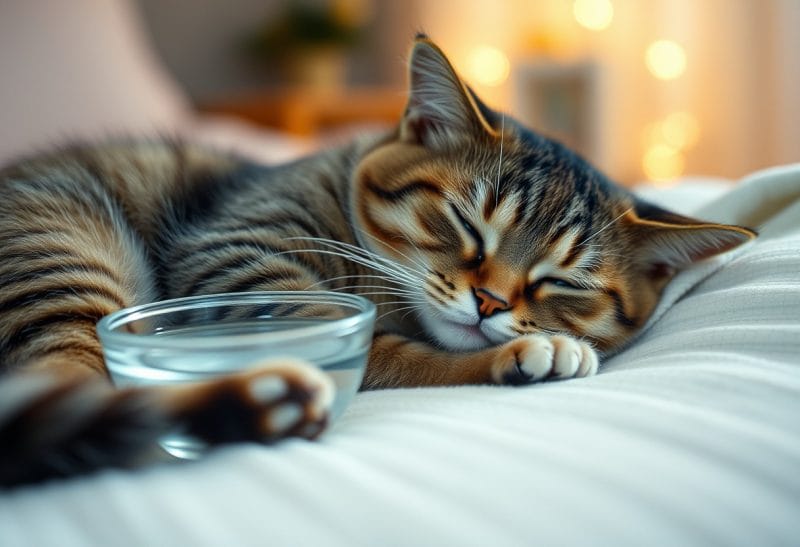Most pet owners want to do everything possible to help their sick cats recover quickly. One common question you might have is whether sugar water can provide any benefits during this time. In this blog post, you’ll learn about the potential advantages and risks of giving sugar water to your feline friend, ensuring you are well-informed when making decisions about their health. Understanding the right approach to hydration and nutrition is important in caring for your sick pet and helping them regain their strength.

Key Takeaways:
- Hydration is crucial for sick cats, but sugar water may not be the best choice.
- Excessive sugar can lead to additional health issues, such as obesity or diabetes, in cats.
- Consult a veterinarian for appropriate hydration solutions and care for your cat’s specific condition.
Understanding Feline Health Needs
To ensure your cat remains healthy, it’s important to understand their unique health needs, particularly during illness. Felines require a balanced diet rich in proteins, fats, vitamins, and minerals to support their bodily functions. Hydration is vital during sickness, as it helps maintain energy levels and supports recovery. Being attentive to their nutritional requirements can make a significant difference in their well-being.
Nutritional Requirements
Feline health relies on a blend of imperative nutrients, with proteins being vital for muscle repair and fats providing energy. Vitamins and minerals play important roles in maintaining immune function and overall health. You should also monitor your cat’s hydration closely during illness, as dehydration can hinder the healing process.
Symptoms of Illness in Cats
Cats exhibit various signs of illness, such as lethargy, loss of appetite, vomiting, and diarrhea. These symptoms can lead to decreased hydration levels, significantly impacting your cat’s health. It’s imperative to observe any changes in your cat’s behavior, as quick action may be needed (a visit to the veterinarian may be necessary).
Cats can be quite adept at hiding their discomfort, so you should be alert for subtle changes that may indicate illness. In addition to the symptoms mentioned, you may notice changes in grooming habits or litter box usage. It’s important to address these signs promptly, as timely intervention can help prevent complications (consider seeking veterinary advice if symptoms persist).
This understanding of your cat’s health and nutritional needs can empower you to make informed decisions about their care. Staying attentive to their symptoms can prevent serious health issues and reduce the risk of dehydration during illness.
The Role of Hydration
Assuming your cat is feeling unwell, hydration becomes a vital aspect of their recovery. Maintaining proper fluid levels helps support important bodily functions and promotes healing. When your cat is sick, they may not drink enough on their own, which can result in dehydration. This condition can lead to serious complications, including kidney problems, electrolyte imbalances, and a weakened immune system, ultimately hindering their overall health and recovery.
Importance of Fluid Intake
For sick cats, fluid intake is important for maintaining their overall health. Dehydration can drastically affect their organs and lead to increased stress on their body. The right balance of fluids helps ensure that your cat’s metabolism remains functional and supports normal physiological processes, including temperature regulation and nutrient transport. By encouraging adequate fluid intake, you foster an environment that promotes healing and recovery.
Hydration Approaches
Between the common options for hydrating your cat are plain water, flavorful broths, and specially formulated electrolyte solutions. These alternatives provide necessary hydration while appealing to your cat’s palate more than sugar water, which may not be suitable for their needs. Each method has its benefits, helping boost fluid intake and ensuring your cat receives the hydration they require during illness.
In addition to these options, it’s important to consider your cat’s preferences and health status. Some cats may be more willing to drink broth, while others might respond better to engaging in playful water fountains. Always ensure that fresh, clean water is readily available. If your cat is particularly reluctant to drink, you might also try offering ice cubes or adding water to their dry food. Tailor your approach based on what keeps your cat hydrated and supported during their recovery.

Sugar Water: Benefits and Risks
Despite its appealing sweetness, sugar water can have both benefits and risks when it comes to your sick cat. While some pet owners believe it helps, it’s necessary to be aware of how it might affect your feline friend’s health. For instance, our baby Mika is sick, we went to the vet this morning and explored alternatives like sugar water, but it’s vital to weigh the pros and cons before making a decision.
Potential Benefits of Sugar Water
Between providing a quick energy boost and encouraging fluid intake, sugar water could offer some short-term benefits for your sick cat. When a cat isn’t eating well, a small amount of sugar in water may entice them to drink, helping to prevent dehydration. This can be particularly helpful when your cat is feeling weak or lethargic, as the sugar can serve as an immediate energy source.
Risks and Considerations
Sugar water may seem harmless, but it is important to consider its potential downsides for your cat. Your feline could face the risk of obesity and dental issues from excess sugar consumption. Additionally, before giving your cat sugar water, consulting with a veterinarian is advisable to ensure that it’s appropriate for your pet’s specific health conditions.
Risks associated with administering sugar water to your cat include not only weight gain but also potential development of diabetes over time. Frequent consumption can lead to dental problems, as sugar promotes plaque and tartar buildup. Thus, it is necessary to seek veterinary advice to ensure this treatment aligns with your cat’s unique health needs and situation.
Veterinary Recommendations
Many veterinarians advise against using sugar water as a remedy for sick cats, particularly because it may not provide the necessary nutrients they require. Instead, they encourage pet owners to follow protocols such as the Fading Kitten Emergency Protocol, which outlines effective strategies for hydration and nutrition.
Consulting a Vet
With any health issue in your cat, consulting a veterinarian is vital for specialized guidance on hydration and nutrition tailored to your cat’s specific condition. Expert advice can help ensure your cat’s recovery, as hydration is a critical component of care during an illness (making the choice of what to offer your cat especially important).
Alternative Solutions
About exploring alternative hydration strategies can be beneficial for your sick cat. Specialized electrolyte solutions or hydrating gels specifically designed for cats may offer more effective hydration compared to sugar water.
It is necessary to choose products formulated for feline health, as these alternatives can provide the necessary electrolytes and fluids needed during recovery. Always consult with your veterinarian before introducing any new products to ensure they are suitable for your cat’s specific health needs.
To wrap up
Conclusively, while sugar water may provide a temporary energy boost for your sick cat, it is not a substitute for proper veterinary care. If your cat is unwell, it is important to consult with your veterinarian to ensure their health needs are adequately met. Relying solely on home remedies like sugar water may not adequately address underlying issues, and your vet can recommend suitable treatments to help your feline friend recover.
FAQ
Q: Is sugar water safe for sick cats?
A: While sugar water can sometimes provide a quick source of energy for a sick cat, it is generally not recommended. Cats have specific dietary needs, and excessive sugar may lead to additional health issues like diabetes or obesity. It’s important to consult a veterinarian before introducing any sugary solution to your cat’s diet.
Q: What alternatives can I use to help a sick cat stay hydrated?
A: If your cat is not drinking enough water, consider offering flavored fluids such as low-sodium chicken broth or specially formulated cat hydration solutions available at veterinary clinics. Wet cat food can also help increase fluid intake. Always consult a vet for the best options tailored to your cat’s health condition.
Q: Can sugar water help with a cat’s energy levels during illness?
A: Sugar water may provide a temporary boost in energy, but it is not a substitute for proper veterinary care or a balanced diet. If your cat is lethargic or not eating, it is important to seek veterinary advice to determine the underlying cause of the illness and receive appropriate treatment.
Q: How can I encourage my sick cat to drink more fluids?
A: To encourage hydration, try offering fresh, clean water at room temperature. You can also place multiple water bowls around your home or use a cat water fountain to attract their interest. Adding a small amount of tuna juice or low-sodium broth to the water can make it more appealing. Consult your veterinarian for additional strategies based on your cat’s condition.
Q: When should I take my sick cat to the veterinarian instead of trying at-home remedies?
A: You should seek veterinary care immediately if your cat shows severe symptoms such as persistent vomiting, diarrhea, difficulty breathing, lack of appetite for more than 24 hours, or signs of pain and distress. Professional evaluation is important to determine the appropriate care for your sick cat and to avoid worsening their condition.










